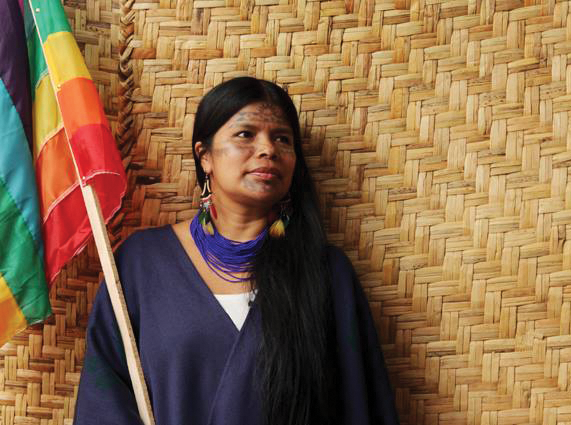The Catholic Church needs to incorporate indigenous people into its environmental advocacy to effectively combat the degradation of the Amazonian ecosystem, Catholic priests and environmental activists said March 20.
A movement to protect the environment must incorporate indigenous peoples in its advocacy, according to Patricia Gualinga, an indigenous rights activist from the Kichwa people of Ecuador.
“This struggle that is coming at us and which will come cannot find us isolated or fragmented, because the situation is going to be so complex that it needs to be done not only for the indigenous people in the Amazon, but for the whole planet,” Gualinga said at the March 20 press conference.
Gualinga spoke with other indigenous rights activists and church officials at the press conference for a three-day convention titled “Integral Ecology: A Synodal Response from the Amazon and Other Essential Biomes/Territories for the Care of our Common Home,” hosted by Georgetown. The event brought together church leaders, indigenous human rights activists and members of Red Eclesial Panamazónica, a network of Latin American church officials and indigenous groups that aims to counter environmental degradation across the world. REPAM organized “Integral Ecology” as part of its efforts to address environmental threats facing indigenous inhabitants of the Amazon.
Though “Integral Ecology” was closed to the press and public, priests and activists participated in the press conference to shed light on their working meetings.

The three-day summit aims to strengthen ties between priests and indigenous leaders, like Patricia Gualinga of the Kichwa people, in preparation for an assembly of bishops called by Pope Francis on conservation in the Amazon.
Energy corporations are particularly responsible for devastating the land of indigenous communities, according to Cardinal Pedro Barreto, the archbishop of Huancayo, Peru, and the vice president of REPAM.
“The direct threats come many times from the corporations — the oil-extracting corporations — and often with cooperation from South American states,” Barreto said at the press conference.
These corporations threaten the livelihood of the indigenous groups that have lived in Amazon for centuries, but often face punishment for advocating for their rights, according to Gualinga.
“Communities are being criminalized; some are in prison, some are threatened and harassed,” Gualinga said. “This creates a lot of fear in those who are dedicated to protecting the Amazon.”
The church has focused on outreach to indigenous communities for its environmental efforts during the new papacy, according to Fr. Matthew Carnes, S.J., Georgetown associate professor of government and director of the Center for Latin American Studies. Carnes cited the Church’s collaboration with indigenous rights activists in forming REPAM as a recent example of this outreach at the conference.
The conference is inspired by Pope Francis’ 2015 encyclical “Laudato Si,” a document that critiques environmental degradation and calls for the care of our planet as a common home.
The conference also precedes an upcoming October 2019 synod, an assembly of bishops called by Francis. Titled “Amazonia: New Paths for the Church and for an Integral Ecology,” the synod will address issues similar to those highlighted in “Laudato Si” as they apply to the Amazon basin and will be the first in Church history focused on a particular region of the world.
The property rights of Amazonian indigenous people have to be respected because they settled on the threatened land long before others tried to extract resources from the land, according to Barreto.
“The indigenous peoples have been there in the rainforest for centuries,” Barreto said. “Nevertheless, they are not recognized as the owners of their land, and this is the most important issue at stake. So we need to learn from the indigenous to live in harmony with the land, with the earth, with the water.”
Deforestation will leave 27 percent of the Amazon without trees by 2030 if the current trend continues, a problem largely attributable to deforestation for agricultural and ranching land, according to the World Wide Fund for Nature, an environmental advocacy group.
The effort is focused on bringing together individual, small voices to form a powerful network, according to Barreto.
“I like to use the image of a river: here we are, little rivers, coming together into a big river and bringing the voices of the indigenous communities trying to speak out on behalf of the care of our common land,” Barreto said.















